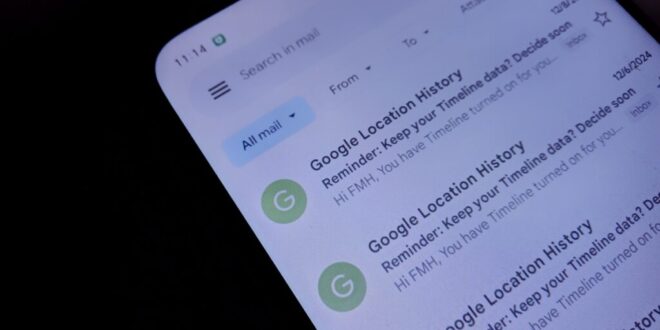Google regularly sends users reminders about their Location History and Timeline data, highlighting just how closely your movements can be tracked—often without you realising it.
Credit : Fajri mulia Hidayat / Shutterstock
Google is really tracking your every move. You might be surprised…
Today, smartphones are used for almost everything. This includes checking the local weather and finding the nearest late night shop. If you use Google Maps you are probably thankful for the shortcuts and traffic reports. You might not be aware that Google tracks your movements as you navigate from A to B. This is like having an invisible digital companion, one that you never asked for.
Most of us don’t see this as an immediate concern. Download an app, accept a few permissions and you’re done. You’re off. What if Google plotted every place you visited neatly on a timeline? It’s not science fiction—it’s already happening. If you haven’t gone into your settings to turn it off, then your phone probably does this now.
Google’s Hidden Timeline Tracks Your Every Move
Google collects these details to aid you. Maps history will help you if you ever want to visit that amazing tapas bar again in Malaga. Or maybe you’ve forgotten where you parked in Alicante—no worries, Google’s got you covered. This sounds great in theory, but it has another side.
This same map also records your daily activities: your commutes, your trips to the supermarket, your holidays, and even those times you sneaked off on a Friday afternoon for a little beach time. And it’s not just for your eyes—Google’s servers are quietly storing all this, creating a detailed log of your movements.
If this makes you uncomfortable, you are not alone. Google has been fined in Europe for not being transparent enough about the way it collects and utilizes our data. The whole thing can feel like an invasion to privacy for many people, especially if it is done without their explicit consent.
How to see (and delete!) what Google knows of your location
What’s the good news? The good news? You can do this by pressing a button that is not so obvious. Turn off Google’s location tracking—and it only takes a minute.
Here’s What You Should Do:
- Open Google Maps.
- Click on your profile photo in the upper right corner.
- Find ‘Your data in Maps’ or ‘Location History’ (the name sometimes varies).
- You can check if the location history is enabled or disabled. You want Google to stop tracking you? Toggle it off.
- While you’re at it, scroll down to see your ‘Timeline’—this is where you’ll find everywhere you’ve been, often stretching back years.
- Do you want to start over? You can delete individual trips, entire days, or all at once. There’s even an ‘auto-delete’ option, wiping your data after 3, 18, or 36 months.
This button is easy to find once you know how. However, most people do not even realize it exists.
Why is it important to know your location history
Perhaps you are asking yourself “Does that really matter?” It’s only a list, right? It’s actually a little more complex.
Location history can be used to serve you eerily specific adverts—like that new coffee shop you walked past, which suddenly pops up on your Instagram feed. All your data could be compromised if there is ever a breach of security (and let’s admit it, this happens). Do you really trust Google?
From a personal point of view, there’s something a little unsettling about someone—or something—knowing more about your routine than you do. When I scrolled down my timeline, I was shocked (and a little embarrassed) at how much my life had been mapped out by an algorithm.
Google is convenient, but at what cost?
Some people love this feature. The location history is useful if you tend to travel or forget where you have been. If you’re concerned about your privacy, turning it off could be a welcome change.
The choice is ultimately yours. The most important thing is that you know what’s going on—and that you have the option to opt out.
You can choose to continue allowing Google to track you, or you can press the button and completely disappear from Google’s map (digitally). Share You can also find out more about us on our website. thoughts in the comments—because your digital life should always be your business.
 Costa News Spain Breaking News | English News in Spain.
Costa News Spain Breaking News | English News in Spain.






